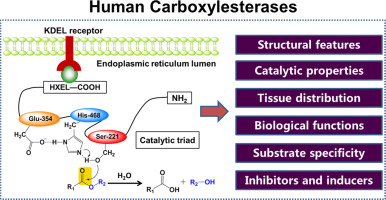-
Neuroscience & Pharmacology Discussion Welcome Guest
Posting Rules Bluelight Rules Recent Journal Articles Chemistry Mega-Thread FREE Chemistry Databases! Self-Education Guide -
N&PD Moderators: Skorpio | someguyontheinternet
You are using an out of date browser. It may not display this or other websites correctly.
You should upgrade or use an alternative browser.
You should upgrade or use an alternative browser.
Disabling The Esterase Enzyme.
- Thread starter Rectify
- Start date
Wouldn't it also have problematic effects a la organophosphates if irreversible? That enzyme does some heavy lifting.Either Reversibly Or Irreversibly.
Doing So Would Make Cocaine, Heroin, And Methylphenidate Last A Lot Longer.
I Would Do It.
Just My 2 Cents.
My 6th Sense Is Free.
4meSM
Bluelighter
There are many different esterases. You'd probably want to target carboxylesterase 1 (hCE1), which is mostly present in the liver, and/or hCE2 which is found all over the body. AFAIK, those are the main esterases involved in the metabolism of drugs containing ester or amide groups.
Trying to inhibit those enzymes seems a bit risky if it's just to increase the duration of the drugs you mentioned, it may have unintended consequences. Selectivity is particularly important here, you wouldn't want to inhibit something like acetylcholinesterase by mistake.
But it would be pretty interesting if you managed to find a very selective inhibitor that is also reversible and safe to consume. In fact there are quite a few articles on this topic.
Some info regarding human carboxylesterases:

 www.sciencedirect.com
www.sciencedirect.com
Trying to inhibit those enzymes seems a bit risky if it's just to increase the duration of the drugs you mentioned, it may have unintended consequences. Selectivity is particularly important here, you wouldn't want to inhibit something like acetylcholinesterase by mistake.
But it would be pretty interesting if you managed to find a very selective inhibitor that is also reversible and safe to consume. In fact there are quite a few articles on this topic.
Some info regarding human carboxylesterases:

Human carboxylesterases: a comprehensive review
Mammalian carboxylesterases (CEs) are key enzymes from the serine hydrolase superfamily. In the human body, two predominant carboxylesterases (CES1 an…
All good points (especially re difficulty to achieve selectivity between ces and the cholinesterase species).There are many different esterases. You'd probably want to target carboxylesterase 1 (hCE1), which is mostly present in the liver, and/or hCE2 which is found all over the body. AFAIK, those are the main esterases involved in the metabolism of drugs containing ester or amide groups.
Trying to inhibit those enzymes seems a bit risky if it's just to increase the duration of the drugs you mentioned, it may have unintended consequences. Selectivity is particularly important here, you wouldn't want to inhibit something like acetylcholinesterase by mistake.
But it would be pretty interesting if you managed to find a very selective inhibitor that is also reversible and safe to consume. In fact there are quite a few articles on this topic.
Some info regarding human carboxylesterases:

Human carboxylesterases: a comprehensive review
Mammalian carboxylesterases (CEs) are key enzymes from the serine hydrolase superfamily. In the human body, two predominant carboxylesterases (CES1 an…www.sciencedirect.com
I still feel that irreversible esterase inhibition would be quite nuclear option.
I feel like I've heard unsubstantiated rumors about aspirin potentiating cocaine via competitive carboxyesterase inhibition. Is there merit to this or is it one of those things that doesn't pan out when tested? Now I want to also see if aspirin acylates anything other than COX enzymes.
Edit: so this review says aspirin activates all kinds of things. Bovine serum albumin, transglutiminase, even p53.
I feel like those are likely insiginificant clinically (would be interesting to compare percent acylated protein by mass spec and see the ratio of individual acylated proteins to the COX isoforms.
I doubt these are significant because p53 inhibition would be pretty damn carcinogenic, and aspirin is epidemiologically not a carcinogen
Molecular targets of aspirin and cancer prevention - PMC
Salicylates from plant sources have been used for centuries by different cultures to treat a variety of ailments such as inflammation, fever and pain. A chemical derivative of salicylic acid, aspirin, was synthesised and mass produced by the end of ...
Last edited:




